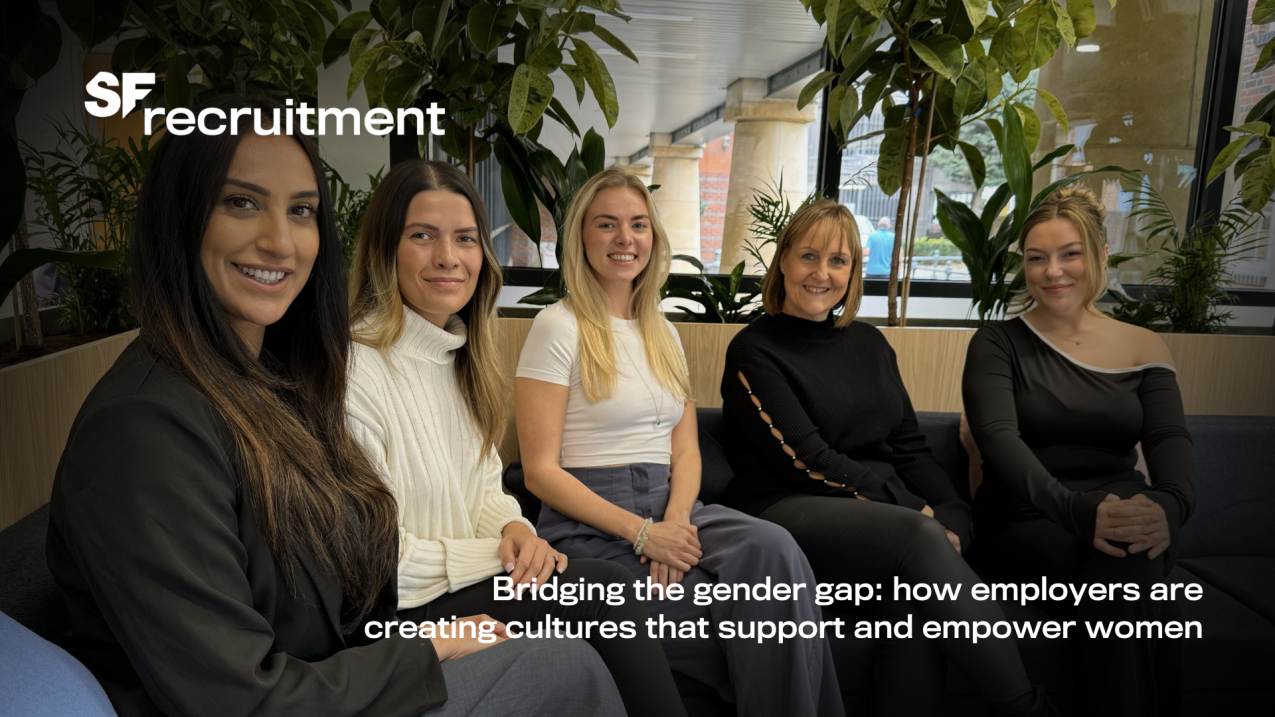
Bridging the gender gap: how employers can create cultures that support & empower women

As a female CEO of a leading recruitment business, I am a strong advocate for flexibility as a crucial pillar in fostering a diverse and inclusive workplace. At SF Recruitment, we made flexibility a core part of our business model in 2021, and we've since witnessed its profound impact on both our employees and the business as a whole.
Improving Profitability
Championing gender diversity and inclusion is not just morally sound—it’s also smart business. Research consistently shows that companies with diverse teams enjoy better financial performance, improved decision-making, and greater innovation. By closing the gender gap, businesses can access a larger talent pool, bringing a range of perspectives and experiences that fuel success. At SF Recruitment, we've experienced this first-hand. Embracing flexibility has led to happier employees, increased profits, and ultimately, a more resilient business. It’s been a win-win on all fronts.
Supporting Access to Higher-Paid Roles and Opportunities
Flexible working is a powerful way for employers to empower women in the workplace. Flexibility allows for a balance that enables women to manage responsibilities outside of work, which—despite societal shifts—still tend to disproportionately fall on them. Research highlights that the "motherhood penalty" accounts for a staggering 80% of the gender pay gap.
Flexible working enables women to access higher-paid roles that might have previously been out of reach due to rigid hours and workplace cultures. It also makes it easier for women to return to work after career breaks. At SF Recruitment, many of our part-time employees are mothers, some of whom have rejoined the workforce following a break. Not only has this flexibility allowed them to continue progressing in their careers, but it has also proven that working part-time does not equate to lower output or missed opportunities. We've seen an increase in the promotion of female employees, demonstrating that flexibility enhances—not diminishes—career prospects.
We also see an encouraging trend of fathers taking advantage of flexible working arrangements, allowing them to share parental responsibilities. This shift doesn’t just positively impact our business; it also enables their partners to pursue their careers without being the default parent. This mutual flexibility is fostering more gender-equitable households and workplaces.
Achieving a Zero Gender Pay Gap at SF
Flexible working has been instrumental in SF Recruitment's journey to closing the gender pay gap. Every role at our company is flexible, designed to meet each individual’s needs. This approach has allowed us to attract and retain a more diverse workforce, reduce turnover, and enhance employee engagement and productivity. Our experiences and the data from companies we advise affirm that flexible working models are a significant solution to gender pay disparities.
Changing Company Culture – It Starts at the Top
For any business serious about addressing the gender pay gap, flexibility must be championed at the highest levels. At SF Recruitment, buy-in from senior leaders was essential to shift the culture of our traditionally long-hours, work-hard/play-hard industry. Getting senior directors on board meant not only setting policies but also living by them—demonstrating flexibility in their work lives, openly discussing family commitments, and actively checking in on team members’ work-life balance. This transparent approach has been key to our success in building a genuinely supportive and flexible workplace.
Conclusion
Flexible working is a powerful business decision and a necessary step in bridging the gender gap in the workplace. By fostering an environment that supports work-life balance and enables women to pursue higher-paid roles, employers can build positive, empowering cultures that benefit everyone. For us at SF Recruitment, flexibility has been a cornerstone of our journey toward a more inclusive workplace—one where business performance thrives alongside diversity, paving the way for a fairer, more successful future.
Related News



Social media has drastically improved the way we recruit within SF Recruitment.
What is it, then, about using LinkedIn, Twitter, Facebook, Google+ et al that seems to seriously boost your prospects of landing that job?


